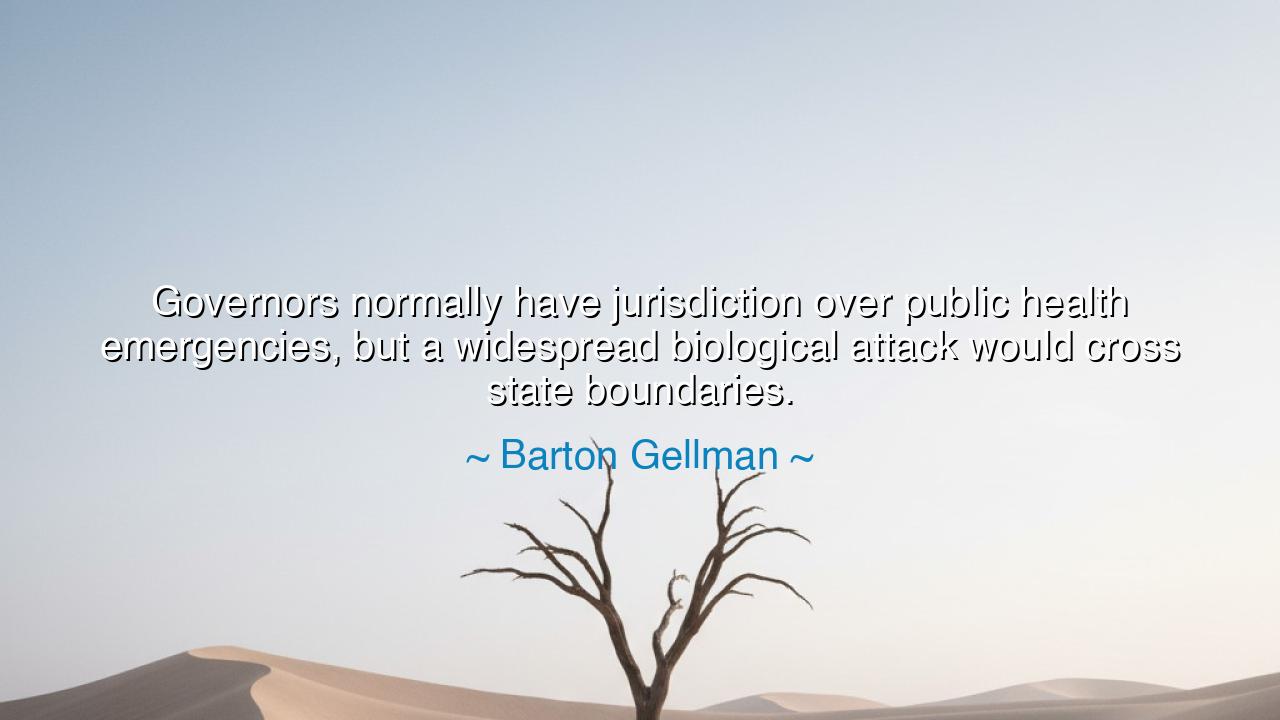
Governors normally have jurisdiction over public health
Governors normally have jurisdiction over public health emergencies, but a widespread biological attack would cross state boundaries.






The writer and truth-seeker Barton Gellman once spoke with the voice of warning and wisdom: “Governors normally have jurisdiction over public health emergencies, but a widespread biological attack would cross state boundaries.” At first hearing, this may sound like the cool analysis of politics and policy, yet beneath it lies a profound meditation on the fragility of human order. For what Gellman names is not merely a fact of governance—it is a truth about interdependence, about the limits of our divisions, and about the moment when the walls we build between ourselves can no longer protect us.
In the old world, kingdoms built borders of stone and law. Each ruler believed his realm could stand apart from his neighbor, safe within its lines. Yet the plagues of history cared nothing for boundaries. When pestilence rose like a shadow across the land, it swept through palaces and huts alike. So too does Gellman remind us that in the face of a biological threat, the human family is one body—and when one part sickens, all are afflicted. The jurisdiction of governors fades before the power of a contagion that knows no allegiance to state or crown.
Think upon the Black Death, which in the fourteenth century crossed oceans and mountains to humble all of Europe. Kings and priests, scholars and peasants—all fell together beneath its hand. The laws of nations broke before the law of nature. It was then, too, that people learned a terrible wisdom: that survival depends not on isolation, but on unity, on shared vigilance and compassion. What one village refused to acknowledge, the next would pay for in sorrow. And so Gellman’s words echo that same eternal truth—that in times of vast peril, no single ruler, no single people, can bear the burden alone.
When Gellman speaks of a biological attack that would “cross state boundaries,” he reminds us that our age, for all its technology, is still bound by the same frailty as those who came before. The world has grown vast in communication yet perilously small in separation. A breath in one corner of the earth may bring sickness to another before the dawn. In such a time, the very structure of governance—the proud divisions of authority—must bend before the higher need for cooperation. For when the invisible enemy comes, it does not ask for permission to pass from state to state, or from heart to heart.
Consider the story of the 1918 influenza pandemic, when the world reeled beneath a silent storm. Cities closed their streets; nations sealed their borders. Yet even in their efforts, the sickness spread, carried by soldiers, travelers, and the unseen current of human contact. It was only when communities began to share knowledge, medicine, and sacrifice that the tide began to turn. The lesson was carved in grief but written for all time: no wall can stop the wind, and no law can govern the breath of the world.
Thus, Gellman’s quote is not merely about the powers of governors or the reach of government—it is about the nature of crisis itself, and the necessity of shared stewardship. When calamity rises beyond the scope of the local, the spirit of leadership must rise beyond the boundaries of the map. The wise ruler, the wise citizen, knows that strength lies not in isolation, but in unity of purpose. To face the vast and the deadly, humanity must act as one body, one mind, one will.
The lesson, then, is this: prepare your heart for solidarity, not separation. Whether in governance or in daily life, know that your well-being is entwined with that of others. The sickness that strikes your neighbor’s door today may knock upon your own tomorrow. In moments of peril, do not think in terms of borders, but in terms of belonging. Stand together, share freely, and act with compassion as your compass.
So, children of the future, heed the wisdom hidden in Gellman’s words: boundaries are useful in peace, but unity is sacred in crisis. When the unseen storm comes—whether of disease, disaster, or despair—let not the pride of jurisdiction divide you. For in the end, it is not the strength of walls that saves a people, but the strength of hearts joined together against the dark.






AAdministratorAdministrator
Welcome, honored guests. Please leave a comment, we will respond soon